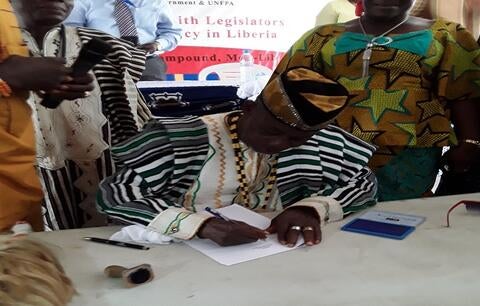Though sex with girls less than 18 years old is classified as statutory rape by Liberia’s Rape Law, people continue to use social and traditional norms to encourage early marriage, inter-generational sexual activity and the imposition of the bread winning role on the girl child.
There is no doubt that these factors are responsible for the high rate of teenage pregnancies and early childbirth in Liberia. According to the 2013 Liberia Demographic and Health Survey, the median age at first sexual debut for girls in Liberia is 16.2 and 18.2 for boys. By age 19, about 59.1 percent of girls are already mothers.
About 14 percent of these teenage mothers are or were adolescents during their first childbirth.
“We believe [it is] a crime against the girl child such as depriving her from reaching her God defined potential by giving her hand in marriage at an early age; thereby exposing her to teenage pregnancy;” say traditional leaders from across the fifteen counties of Liberia as they signed a petition to end early marriage in Liberia.
The traditional leaders say: “it is appalling to note that our tradition which we as traditional leaders are charged with the responsibility to promote and protect in a positive manner has been named [as] one of the instruments in the promotion of teenage pregnancy in Liberia.”
The Chairman of the National Council of Chiefs and Elders of Liberia, Chief Zanzan Kawor warned traditional leaders against taking underage girls as a wives or sanctioning of marriages of underage girls in their community.
Chief Kawor also called on the Government of Liberia to ensure strict implementation of the Rape Law of Liberia and urged community members not to compromise statutory rape cases among themselves.
The Traditional Leaders committed themselves to ensuring that girls are given the chance to education without any form of obstruction in the name of tradition and culture.

The commitment of the traditional leaders was contained in a policy document adopted and submitted to the National Legislature under the guidance and leadership of the National Council of Chiefs and Elders of Liberia, after series of nationwide consultative dialogue on ending teenage pregnancy organized by the National Council of Chiefs and Elders of Liberia with Traditional Leaders and supported by the United Nations Population Fund (UNFPA) with funding from the Embassy of Sweden.
“We Traditional Leaders say now is the time to break the silence and condemn in entirety those things that depressingly affect our children most especially the girls by standing against any form of violence against them and their future;” they declared.
Senator Nyonblee Karnga-Lawrence, who received the policy document on behalf of the Liberian Senate, promised to ensure its onward submission to the leadership of the Upper House of the Liberian Legislature for full consideration. “Ending teenage pregnancy in Liberia is in the interest of all and I am fully committed to lead the way,” says the Grand Bassa County Senator.
“The United Nations Population Fund, is delighted that traditional leaders in Liberia have joined the fight to end child marriage in the country. With child marriage often comes pregnancy, and with child pregnancy come health risks and a curtailed education, undermining girls’ prospects for jobs and self-sufficiency,” says Mr. Fenosoa Ratsimanetrimanana, Officer-In-Charge, UNFPA Liberia.
Mr. Ratsimanetrimanana said UNFPA was committed to ensuring a Liberia where the rights of girls are fully protected.
“As part of UNFPA's transformational goals, we will continue working with our partners to end violence against girls, including child marriage and female genital mutilation. We will work to ensure that all girls, everywhere, enjoy their full spectrum of rights and have the opportunities they need to fulfill their potential. When a girl enjoys her rights, she is able to stay in school, stay healthy and be protected from child marriage and early pregnancy and her full potential may be realized by the time she reaches adulthood,” he adds.


